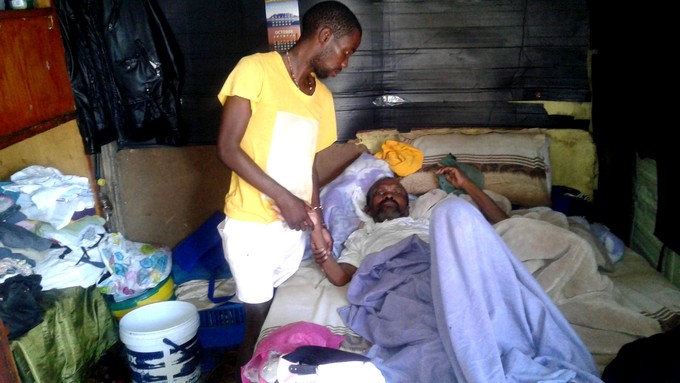Man with epilepsy nurses family
Both his aunt and stepfather have cancer
Xolani Duna is 30 and has epilepsy. He cares for his aunt, who is bedridden and suffering from skin cancer, and his stepfather, who has prostate cancer. They all live in a rented two-roomed shack together with two siblings, a cousin and Duna’s unemployed mother, Nomsobo Gabayi. Their shack in Kayamandi Phase 3 of Khayelitsha Green Point Informal Settlement only has Mshengu toilets, hundreds of metres away.
The two siblings, aged 13 and 17, and their 16-year-old cousin, attend school.
Early in the morning, Gabayi leaves the house to look for piece jobs. Sometimes she returns empty handed. On the day GroundUp visited, she helped a woman with washing and she has a little money to buy electricity.
She said life is not easy for her family but she does what she can to survive.
“I do not like leaving my [epileptic] son to look after my sister and husband, but I have to look for piece jobs. We use my sister’s [social grant] money to transport her to hospital for treatment every month in Tygerberg. We hire a car for R700 every month. If we happen to use a taxi, I have to carry her because she does not have a wheelchair,” she said.
When GroundUp arrived, Duna was sitting next to his 38-year-old aunt, Angie Gabayi. He had a small towel in his hand, beating away flies that kept surrounding her. Visible was a large wound on her left arm. She said she had another wound on her right leg.
“It’s bad; I cannot show it to you,” she said, looking down.
On the opposite side of the room, Duna’s stepfather, Monde Chubeka, 63, was lying in bed. They were chatting, Angie complaining about her pains.
“I sleep in a separate room, but all my family sleep on that side,” said Duna. The room also doubles as a kitchen.
“You cannot stay more than five minutes in this house … The wound in her leg is what’s causing the bad smell,” said Duna.
Duna said his epilepsy can strike at any time. He grew up in the Eastern Cape, in Comfimvaba. He dropped out of school while he was doing grade eight because of his epilepsy. The first time he had a seizure, he was playing soccer.
“I had to come to Cape Town because there was no one to take care of me back home,” he said.
He got a piece job selling vegetables in Epping, but that came to an end after he had a seizure at work.
“Life is not easy, my sister,” he told GroundUp. “I stay here [at home] doing nothing. I have no income. I cannot apply for a grant, because I do not have an ID book. We rely on the child support grant and my aunt and stepfather’s disability grant.”
Monde can hardly walk. To get to the Mshengu toilet with Duna’s help takes 15 minutes. Angie has to use a bucket. Duna takes out the waste and cleans the bucket. He has to clean hers too.
When helping his aunt to the bucket, he says, “She’s ashamed, but there’s nothing she can do.”
It has happened that he has had an epileptic episode while helping her.
“It’s hard for them, because when I’m sick they cannot help me,” he says. “They will wait for our neighbour or my friend when they come to check on us. At least, our neighbour checks up on us every 30 minutes.”
“This woman used to look after me. Now, I’m looking after her … to wash her body and I know she does not like it,” he said.
Support independent journalism
Donate using Payfast

Don't miss out on the latest news
We respect your privacy, and promise we won't spam you.
Next: Bridges For Music under construction
Previous: Masiphumelele mother’s struggle to find school for deaf son
© 2016 GroundUp. 
This article is licensed under a Creative Commons Attribution-NoDerivatives 4.0 International License.
You may republish this article, so long as you credit the authors and GroundUp, and do not change the text. Please include a link back to the original article.

